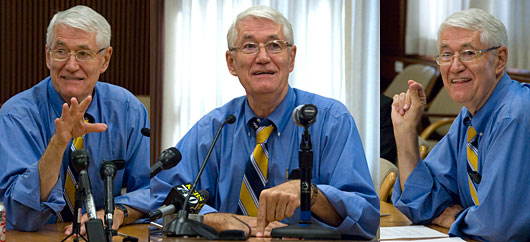As students return to classes, media meet with the chancellor
| 27 August 2009
BERKELEY — In what has become a rite of fall at Berkeley, Chancellor Robert Birgeneau met the press on Wednesday — the first day of classes — for a public glimpse of the view of the campus from California Hall.
![]() Birgeneau on the budget: The Berkeleyan's Q&A with the chancellor
Birgeneau on the budget: The Berkeleyan's Q&A with the chancellor
Fall classes begin amid budget challenges

Chancellor Birgeneau on:
| Unfunded enrollments | |
| Middle-income crisis | |
| Faculty quality and retention | |
| Privatizing the university | |
| Preserving Berkeley's excellence |
He described Berkeley's new crop of 9,400 students as "an exciting and excited class," having met many of them personally at receptions at University House over the past two days. But the focus of the hourlong session with reporters, inevitably, was the campus's bleak budget picture.
"For those of us in administration throughout the UC system, these have been less than inspiring times," Birgeneau said, referring to the current era of furloughs and salary cuts, staff layoffs, reductions in available classes, and a host of other such repercussions triggered by the precipitous drop of $813 million in state funds for the UC system.
At Berkeley, which found itself with a $150 million shortfall in May — some $80 million more than expected before that month's statewide special election — one particularly stark index of the plummet in state support is the skyrocketing number of students for whom the campus receives no money from Sacramento.
Until this year, reported the chancellor, Berkeley footed the bill for roughly 2,400 unfunded students. "Now," he said, "we have a little over 9,000 California students at Berkeley for whom the state is providing zero dollars — no money, none, zero. That translates into saying the entire entering class — the freshmen, the transfer students, the graduate students — are unfunded." That, he added, "is not a stable financial situation."
"If the state doesn't restore the funding for these many, many thousands of students, then one way or another we have to find the resources to support the university," Birgeneau said. "Because it would be a complete abdication of our responsibilities here at Berkeley or at any UC campus to allow the university to deteriorate in quality. That would be a disservice to the people of California, and would not be right."
Similarly, he said the one-year furlough plan that takes effect Sept. 1 is "not stable long-term," noting that in contrast to competitor universities, "we're the only one with a furlough program in which the senior administrators, but most especially the faculty, are taking these large salary cuts."
He called it "a tribute to our faculty and our staff, who are very loyal to the institution, that they are willing to make this personal sacrifice in order to save both the university and the jobs of, especially, our lower-paid staff." The furlough program, he added, has spared about 450 jobs that would otherwise have been lost to layoffs.
He gave reporters a "rough estimate" of 300 layoffs over the course of the year ahead, saying more will be known after campus units submit their plans for taking budget cuts, due on Sept. 15. "We are extremely unhappy about that," he said, "because we have a very loyal staff who have dedicated their lives to education in California."
Birgeneau declared that he was "extremely relieved" when Gov. Schwarzenegger and the Legislature restored funding for Cal Grants, which he termed "essential to our financial aid" for low-income students. When it comes to state residents' access to a top-flight education, he explained, he's most worried about students in the middle-income brackets.
"The upcoming crisis in California will not be for the family whose income is $20,000 a year," the chancellor said. "It will be for someone whose family income is $100,000 a year." Students from middle-income families at that level have limited access to financial aid, he explained, and the burden of paying for a UC education, especially for families with more than one child in college, could become prohibitive.
Digging out of the campus's budget hole, Birgeneau said, will be a multi-year process. But he expressed confidence that Berkeley will succeed not only in turning around its financial picture — by streamlining campus operations, building its real-estate portfolio to reduce rent payments, improving debt management, and other such strategies — but in maintaining its public character.
"Many people say, 'Well, we'll have to privatize,'" he said. "My answer to that is, the United States has enough great private universities. We don't need another one. We need great public universities in this country, and our challenge is to maintain Berkeley and other UC campuses as great public institutions."

